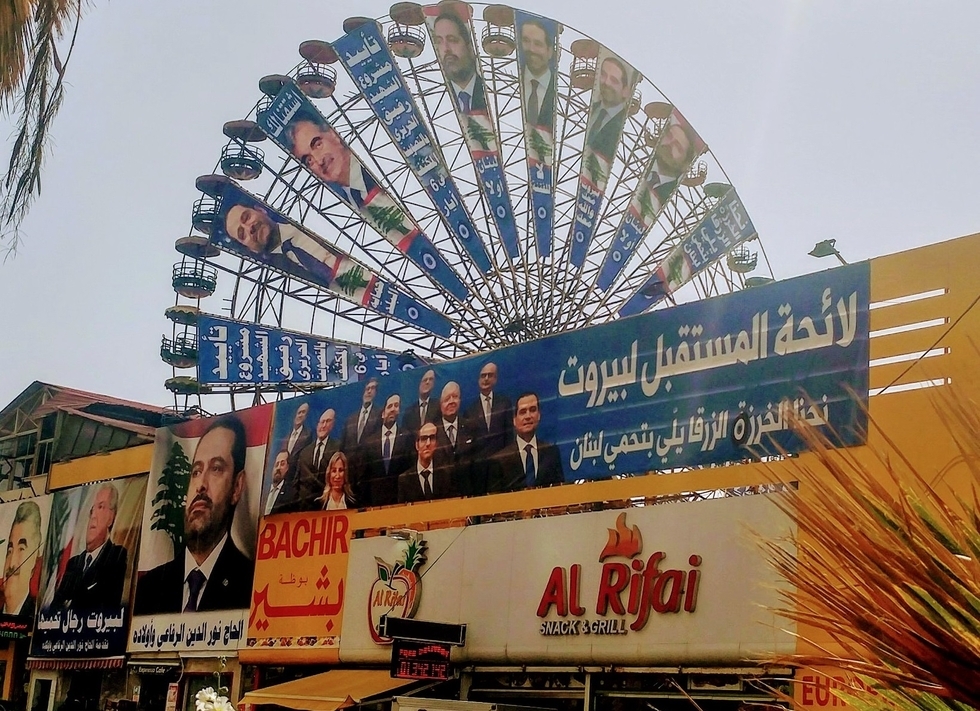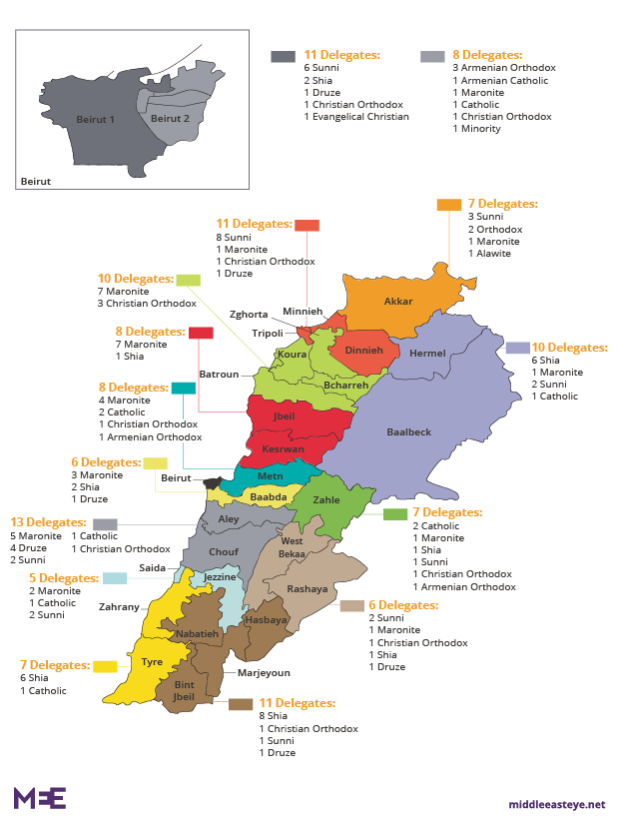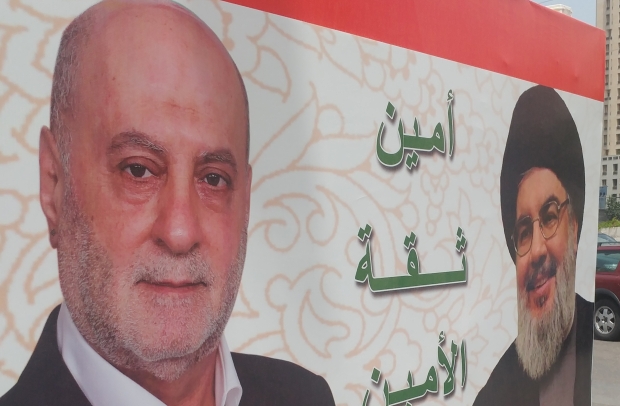Every man for himself: Lebanon election a fight over seats, not visions

BEIRUT - It has been nine years since Lebanon held parliamentary elections, an eternity of shifting politics in a period of instability that has left the political landscape hardly recognisable compared to 2009.
As election day on 6 May draws near, the race is on full display, with the ubiquitous signs and posters in all major cities trumpeting the chances of a multitude of candidates and political leaders.
But where once these politicians and their parties were defined in a polarity that emerged in the wake of former prime minister Rafic Hariri’s 2005 assassination, now the waters are muddied, giving the impression of every man for himself.
The post-2005 political order of the pro-Western "14 March" bloc vs the Hezbollah-led "8 March" alliance is falling apart, experts say.
"This is not a parliamentary legislative election; it is more like a municipal election," Sateh Noureddine, editor-in-chief of the Al Modon news website, told Middle East Eye.
Technically, this is the vote that matters most: Lebanon is a parliamentary republic, where the parliament elects the president, writes laws and passes treaties.
We have given our allies all the freedom to draw their electoral alliances in the way they see fit.
-Ibrahim Mousawi, Hezbollah candidate
Still, Noureddine's comparison with local polls reflects the narrow political aims witnessed in these elections, and stems from a lack of strategic vision offered by any of the major political parties.
Political lines have been blurred in this parliamentary race, analysts say, and alliances of electoral necessity have turned the vote into a competition for seats rather than one of ideas.
Most prominent is the occasional friendship that 14 March leader Prime Minister Saad Hariri has found in Hezbollah's prized partner, President Michel Aoun's Free Patriotic Movement.
Political foes since 2005, the two came together in October 2016 when Hariri agreed to support Aoun’s bid for the presidency, with the premiership offered to him in return.
Besides the Hariri-Aoun alliance, this election features some bizarre coalitions that combine ideological opposites and recent rivals.
Christian FPM candidates are found on the same lists as Al-Jamaa al-Islamiya, the Lebanese branch of the Muslim Brotherhood.
Butros Harb, a veteran independent anti-Syrian MP, is running alongside the pro-Damascus Syrian Social Nationalist Party.
Meanwhile, the Democratic Left, whose name leaves little to the imagination about its political inclinations, is allied with the right-wing Lebanese Forces in the north.
Rima Majed, a political sociology expert who lectures at the American University of Beirut, said unlikely political partnerships in Lebanon are not new.
"This is a [political] class that is aware of its class interest,” Majed told MEE. “They fight over resources when they need to, but when it's about [surviving] they stand together."
14 March undermined
The political schism in Lebanon was once seen as a reflection of broader undercurrents in the region.
Hezbollah and its Shia allies Amal, backed by Iran and Syria, represented the "Axis of Resistance", wanting Lebanon to be a frontline against Israel and "US imperialism". They have traditionally been joined in the 8 March alliance by the Christian FPM.
With the United States and Saudi Arabia in its corner, meanwhile, Hariri’s Future Movement and its partners in the 14 March alliance, such as the Christian Lebanese Forces, wanted Lebanon to be a non-confrontational state friendly to the West and wary of conflict with Israel.
Noureddine said Hezbollah's military victory in Syria, where its forces have played a decisive part in turning the tide of the war in favour of the government, has helped compromise and scatter the 14 March bloc.
Compounding the bloc's issues, Saudi Arabia has suspended much of its support for the Lebanese state and relations with Hariri have soured.
Tensions between Hariri's Future Movement and Riyadh peaked late last year when the prime minister was forced to resign while in Saudi Arabia.
He was reportedly detained on Saudi Crown Prince Mohammed bin Salman’s orders until French President Emmanuel Macron intervened.
Hariri rescinded his resignation when he returned to Lebanon and has apparently since mended ties with the Saudis, appearing in a selfie with Prince Mohammed last month.
Noureddine said Saudi Arabia's mismanagement of its policies towards Lebanon has weakened Hariri's situation.The 14 March politicians who had seen Riyadh as political cover have now discovered that Saudi Arabia is "not concerned" with protecting them, Noureddine said.
As a consequence, some figures have emerged this year threatening to dethrone Hariri as the country's top Sunni leader.
Former justice minister Ashraf Rifi, a former Hariri ally who turned against the prime minister two years ago, accusing him of compromising too much with Hezbollah, has been vying for leadership in his hometown of Tripoli. Now he's looking beyond the northern city.
Rifi is backing candidates against the Future Movement in Tripoli, as well as in Beirut and Akkar in the north.
In Tripoli, former prime minister Najib Mikati has formed his own list as well. Faisal Karami, a former minister and son of late prime minister Omar Karami, has also fielded a list of candidates.
In the capital, other Sunni figures are mounting challenges against Hariri, including billionaire businessman Fouad Makhzoumi.
Still, despite Hariri’s complicated relationship with the Saudis and attempts to work alongside Hezbollah in government, Noureddine said Riyadh has not shown interest in backing the prime minister’s Sunni opponents.
Hezbollah untroubled
Ibrahim Mousawi, a Hezbollah candidate in Baalbeck, said the election is crucial because it will restore and validate the legitimacy of Lebanon’s political system.
Other politicians and experts interviewed by MEE offered similar answers - that the election is important because it's an election, finally.
Hezbollah's main Christian allies in the FPM have linked up with the Shia group's foes in the Future Movement in many districts.
While he would not speculate on the motives of Hezbollah’s allies who have joined the lists of opposing political parties, Mousawi said he doubts that all electoral partnerships will last beyond the elections.
"We have given our allies all the freedom to draw their electoral alliances in the way they see fit," he said.
"There are fundamental national stances and directions that will not be trumped by electoral alliances. So these electoral partnerships will not turn into actual political alliances, in my opinion."
He said the "spirit" of 14 March is still alive, in spite of the failure of its parties to form a unified election front.
"We have no problems with the Future Movement," Bou Younes told MEE. "There may be differences over creating electoral lists, but there are no fundamental disagreements."
There have been some reports of growing Shia opposition to Hezbollah in Baalbeck over deteriorating services in the Beqaa Valley.
The prospects of losing support in what has been a historical stronghold for Hezbollah since its inception in the 1980s has prompted the group's leader Sayyed Hassan Nasrallah to specifically address Beqaa voters several times in the lead-up to the vote.
Mousawi played down the notion that the elections in Shia-majority areas are a referendum on Hezbollah's choices in the past nine years.
He said not everyone who votes against Hezbollah's lists is necessarily voting against the group's military stance.
"In the south and Beqaa Valley, the overwhelming majority of people support the Resistance," Mousawi said, referring to Hezbollah.
"Some people may be critical of the performance of individual Hezbollah or Amal ministers and MPs, but it doesn't mean they don't support the Resistance."
New MEE newsletter: Jerusalem Dispatch
Sign up to get the latest insights and analysis on Israel-Palestine, alongside Turkey Unpacked and other MEE newsletters
Middle East Eye delivers independent and unrivalled coverage and analysis of the Middle East, North Africa and beyond. To learn more about republishing this content and the associated fees, please fill out this form. More about MEE can be found here.







